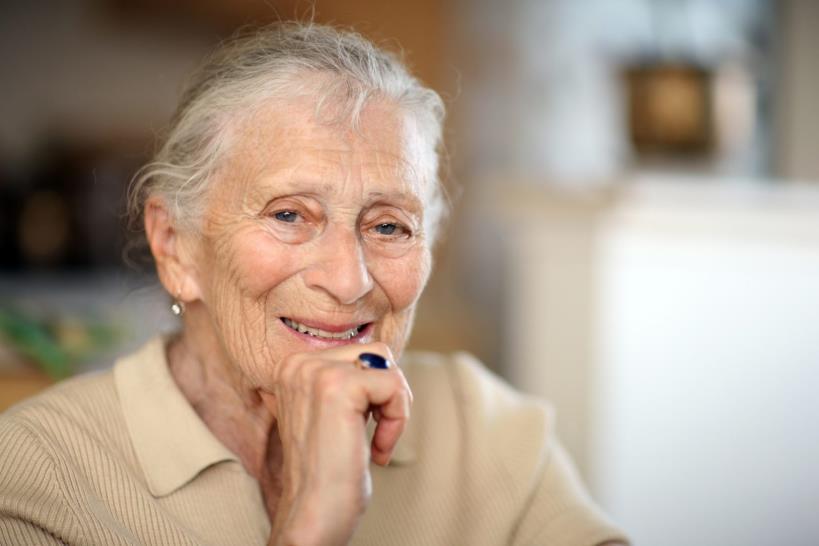篇一 和奶奶一起数豆子
My grandmother suffers from Alzheimer's disease. Seeing her condition deteriorate over time, causing her to drift away from us and knowing there was nothing I could do, created a feeling of hopelessness in me.
我的祖母患有阿尔茨海默病。看到她的病情随着时间的推移不断恶化,使她的生命渐渐离我们而去,并且知道自己什么忙也帮不上,令我感觉非常绝望。
As the years passed and my understanding of the disease grew, my despondency turned first to anger, then resignation, and eventually to acceptance. Though the disease was destined to slowly eat away at my grandmother, there were ways to help slow its progress, including the counting of beans.
随着岁月的流逝,以及我对这种疾病认识的加深,我的沮丧首先变成了愤怒,然后变成了放弃,最后变成了接受。虽然这种疾病注定要慢慢消耗掉我祖母的生命,但还是有办法让这个过程变得缓慢些,其中一种办法便是“数豆子”。
Every night the two of us would sit together and chat while my grandmother would count. The exercise had a dual-effect; it helped to keep her mentally sharp, but also provided a chance for us to grow closer.
每天晚上,我们俩都会坐在一起,一边聊着天,一边我的祖母数着豆子。这种练习具有双重效应:它有助于让我的祖母保持敏捷的思维,同时还给我们提供了一个变得彼此更加亲密的机会。
Gradually however her counting became slower, and she would lose track of things more easily. While at night we would count beans, in the day I immersed myself in studies of the sciences, especially biology. My earlier feelings of hopelessness gave way to optimism; advances in genetic engineering offered the possibility that one day those like my grandmother could be cured, or prevented from developing Alzheimer's in the first place.
然而,她数豆子的速度还是在渐渐变慢,并且变得更容易数错。晚上,我和祖母一起数豆子。到了白天,我就会沉浸在科学研究中,特别是生物学研究中。我之前的绝望逐渐被乐观取代;基因工程方面的发展进步提供了这样的可能性:有一天,像我祖母这样患有阿尔茨海默病的人可以被治愈,或者从一开始就可以防止患上这种疾病。
Seeing my grandmother slip away motivated me to take honours biology courses and participate in extracurricular experiments in high school, to learn more about cells, the nervous system, and how genetic information determines the structure of proteins.
看着我的祖母的生命悄悄从我们身边溜走,激发我在参加荣誉生物课程,也让我有动力参加高中的课外实验,去更多地了解细胞、神经系统,以及遗传信息是如何决定蛋白质的结构。
Preparing for the 2016 iGEM Competition led me to learn more about gene editing techniques, and research in my free time helped me to better understand how our knowledge of chronic aging diseases has grown in the past decade. Gradually I began to see new possibilities for preventing the onset of diseases like Alzheimer's.
为参加2016年国际遗传工程机器大赛(iGEM)所做的准备,让我了解了关于基因编辑技术方面的更多知识;我在业余时间所做的研究,也帮助我更好地了解了过去十年来我们在慢性衰老疾病知识方面的增长历程。渐渐地,我发现了预防阿尔茨海默病等疾病的新的可能性。
Nowadays, my grandmother cannot count beans anymore; she doesn't recognize me at all. Once she used to tell me stories and I confided in her all my problems. Now I am a stranger to her. Sometimes I wonder about other families sitting together out there, counting beans. One day I want to contribute to a future where no child has to watch their grandmother count the time they have left together.
现在,我的祖母已经不能再数豆子了。她完全认不出我是谁。曾经,她给我讲过好多好听的故事,我还会把自己遇到的所有难题都向她倾诉。可是现在,我对于她只是个陌生人。有时候,我的头脑中会浮现出这样一幅画面:有那么一家人,坐在一起,数着豆子。总有一天,我要让这个世界上不再有孩子不得不看着自己的祖母数着与他们共度的时光。

2. Wooden Bowls
篇二 爷爷的木碗
A frail old man lived together with his son, his daughter-in-law, and his four-year-old grandson. His eyes were blurry, his hands trembled, and his step faltered.
一个体弱多病的老人和他的儿子、儿媳以及四岁的孙子生活在一起。他的双眼看不清东西,双手颤抖,步履蹒跚。
The family would eat together nightly at the dinner table. But the elderly grandfather's shaky hands and failing sight made eating rather difficult for him. Peas rolled off his spoon and dropped on the floor. When he grasped his glass of milk, it often spilled clumsily on the tablecloth.
一家人每天晚上都会在餐桌上一起吃饭。但是,老人那颤颤巍巍的双手和逐渐减退的视力让他吃起饭来相当困难。豌豆会从他的勺子上滚下,掉落在地上。当他拿起一杯牛奶的时候,往往会笨拙地将牛奶洒在桌布上。
With this happening almost every night, the son and daughter-in-law became irritated by the mess he made. "We must do something about grandfather," said the son. "I've had enough of his milk spilling, noisy eating and food on the floor," the daughter-in-law agreed. So the couple set up a small table in the corner.
几乎每天晚上都会发生这样的事情,老人搞的这一团糟终于激怒了儿子和儿媳。儿子说:“我们必须对爷爷做点什么了。”儿媳表示同意:“我已经受够了他把牛奶弄洒,吃东西时发出嘈杂的声音,还把食物掉在地板上。”于是,这对夫妻在房屋的一个角落里摆了一张小桌子。
There, grandfather ate alone while the rest of the family enjoyed their dinner at the dinner table. Since grandfather had broken a dish or two, his food was served in wooden bowls. Sometimes when the family glanced in grandfather's direction, he had a tear in his eye as he ate alone. Still, the only words the couple had for him were sharp admonitions when he dropped a fork or spilled food. The four-year-old watched it all in silence.
从那以后,爷爷开始独自一人在小桌子上吃饭,而家里的其他人则仍然在餐桌上享用晚餐。由于爷爷打破了一两个盘子,因此他开始改用木碗进餐。有时,家人会瞥一眼爷爷的方向,看到的总是老人独自一人吃着饭,眼里噙着泪水。尽管如此,这对夫妻依旧只会在爷爷把叉子掉在地上或溅出饭菜时跟爷爷说上一句话,而且还是言辞尖锐的告诫。四岁的孩子默默地看着这一切。
One evening, before supper, the father noticed his son playing with wood scraps on the floor. He asked the child sweetly: "What are you making?" Just as sweetly, the boy replied, "Oh, I'm making a little bowl for you and mama to eat your food from, when I am a grown up." The four-year-old smiled and went back to work.
一天傍晚,晚餐前,父亲注意到儿子在地板上玩着木头碎片。他温柔地问孩子:“你在做什么?”男孩也同样温柔地回答说:“噢,我正在为你和妈妈做一个小碗,等我长大的时候,给你们盛饭菜饭用。”然后,这个四岁的孩子微笑着回到了工作中。
These words struck the parents so much that they were speechless. Tears streamed down their cheeks. Though no words were spoken, they both knew what had to be done. That evening, the husband took grandfather's hand and gently led him back to the family table.
孩子话令父母感到非常震惊,以至于无言以对。眼泪顺着他们的脸颊流淌下来。尽管他们什么也没说,但他们知道要去做什么了。那天傍晚,孩子爸爸拉着爷爷的手,缓缓地带他回到了一家人共进晚餐的餐桌上。
For the remainder of his days, grandfather ate every meal with the family. And for some reason, neither his son nor his daughter-in-law seemed to care any longer when a fork was dropped, milk was spilled or the table cloth was soiled.
在余下的日子里,爷爷和家人始终一起共进每一餐。出于某种原因,他的儿子和儿媳似乎不再在意他把叉子掉落在地上,将牛奶弄洒,或者把桌布弄脏。













